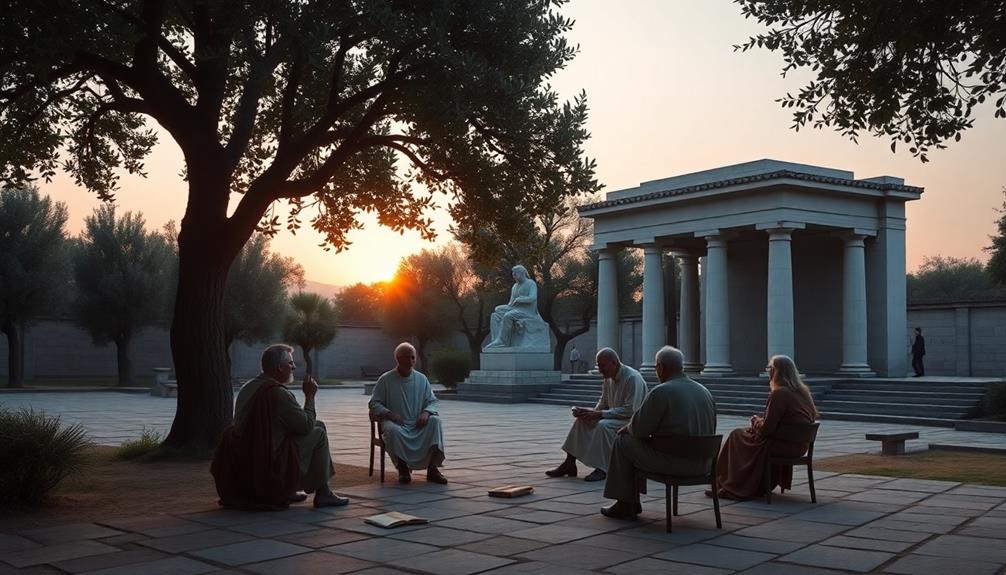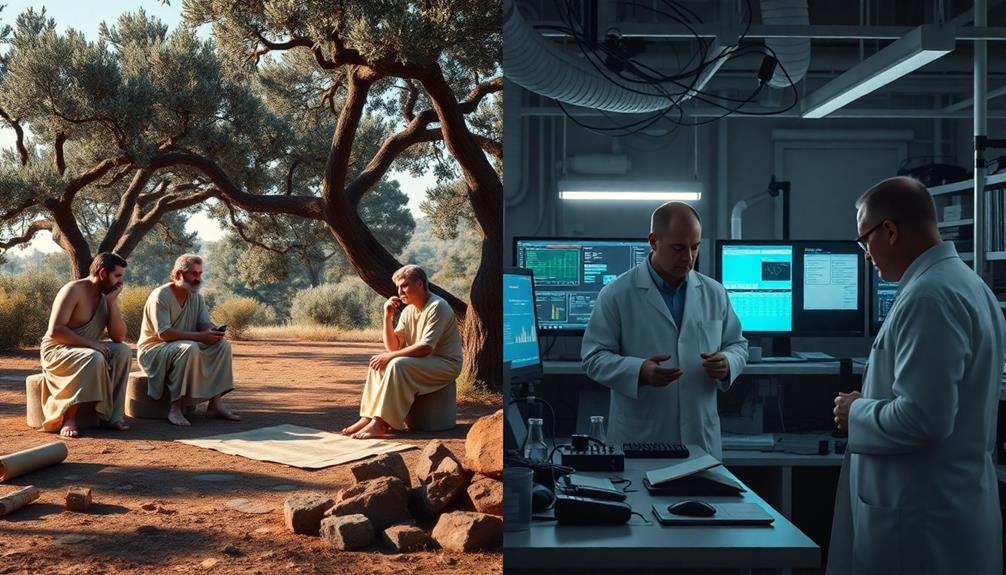To think like a skeptic, take cues from ancient Greek philosophers. Start by questioning your assumptions and suspending judgment. Embrace the unknown and remain open-minded, just as Sextus Empiricus and Pyrrho of Elis advised. Engaging with diverse perspectives can enrich your understanding. Employ critical thinking techniques, like probing questions and recognizing biases, to assess evidence thoroughly. This mindset fosters resilience against misinformation and polarized views. Ultimately, learning to navigate uncertainty not only sharpens your analytical skills but also deepens your insights. Stick around, and you'll discover more about how these timeless lessons can transform your approach to critical thinking.
Key Takeaways
- Embrace radical suspension of judgment to foster inner peace and challenge dogmatic beliefs.
- Engage in open dialogue and consider diverse perspectives to enhance critical thinking.
- Question assumptions and recognize cognitive biases to sharpen analytical abilities.
- Accept uncertainty as a pathway to personal growth and intellectual development.
- Continuously inquire and adapt to navigate misinformation and polarized ideologies effectively.
The Essence of Skepticism
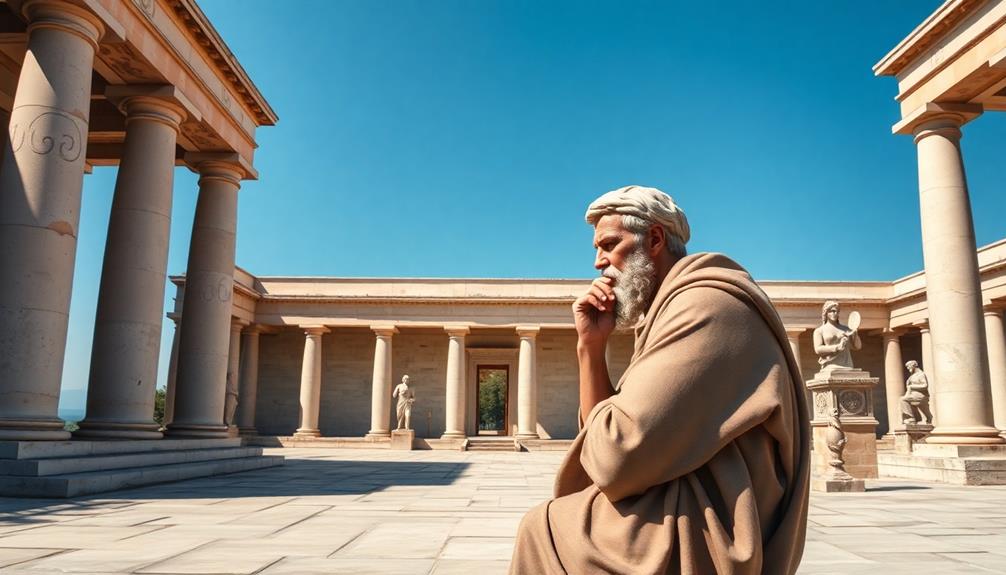
Skepticism is more than just doubt; it's a powerful approach to understanding the world. Rooted in ancient Greek philosophy, skepticism encourages you to engage in radical suspension of judgment, challenging dogmatic beliefs that often cloud your thinking. By following the teachings of Sextus Empiricus, you learn to withhold belief in non-evident matters, focusing instead on what's clear and evident in your everyday experiences.
At its core, skepticism emphasizes the importance of inquiry, urging you to examine multiple perspectives and question your assumptions. This practice fosters open-mindedness and enhances your critical thinking skills, allowing for deeper exploration of ideas. Rather than feeling pressured to accept fixed beliefs, you can cultivate tranquility by embracing uncertainty and doubt.
This nonjudgmental approach to inquiry enables you to navigate the complexities of knowledge and belief, both in ancient times and today. By adopting skepticism as a tool, you empower yourself to explore life's questions without the constraints of preconceived notions or biases.
Ultimately, embracing skepticism leads you to a richer understanding of the world and your place within it.
Key Figures in Ancient Skepticism
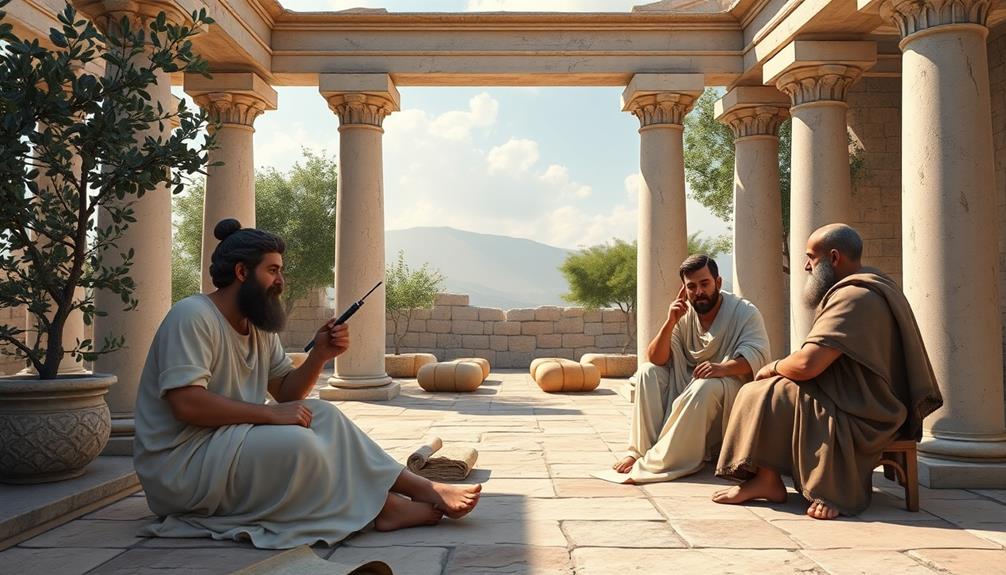
The foundation of ancient skepticism rests on the contributions of several key figures whose ideas continue to resonate today. Sextus Empiricus stands out as the most notable skeptic, advocating for the radical suspension of judgment to achieve tranquility. His extensive writings on Pyrrhonism emphasize that withholding belief in absolute knowledge can lead to inner peace.
Pyrrho of Elis, the founder of skepticism, taught that you should live according to appearances, encouraging you to refrain from asserting certainty in knowledge claims. His ideas laid the groundwork for later thinkers.
Aenesidemus, a successor of Pyrrho, further developed this philosophy with his Ten Modes, which served as arguments against dogmatism, promoting the importance of suspending judgment.
Carneades, another prominent figure from the Academic school, argued against Stoic certainty, asserting that absolute knowledge is impossible. His contributions enriched the dialogue surrounding ancient skepticism, shaping the way you think about knowledge today.
Together, these key figures not only influenced their contemporaries but also laid the groundwork for modern skeptical thought, impacting philosophers like Montaigne and Descartes, who grappled with similar questions of certainty and belief.
Principles of Open-Mindedness
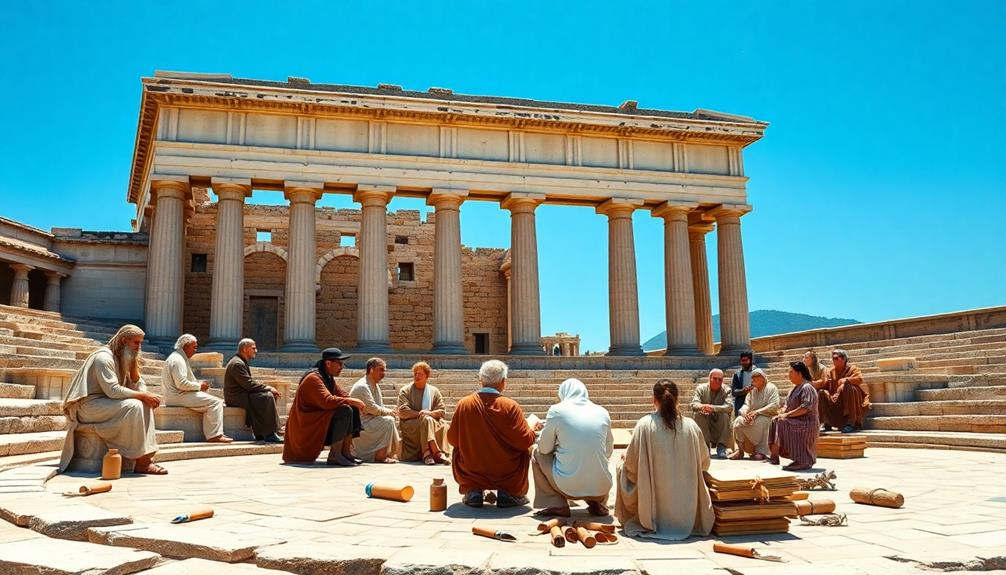
To think like a skeptic, you need to embrace diverse perspectives and question your assumptions regularly.
This openness not only broadens your understanding but also strengthens your critical thinking skills.
Embrace Diverse Perspectives
When you embrace diverse perspectives, you open yourself up to a world of understanding that challenges your own beliefs and assumptions. This practice is rooted in the principles of skepticism championed by Sextus Empiricus, who argued that seeing multiple sides of an argument is essential for avoiding dogmatism.
By fostering open-mindedness, you enhance your critical thinking skills and engage in rational discourse, which are fundamental for constructive debates. This open-minded approach is particularly beneficial in complex situations, such as effective co-parenting communication, where understanding differing viewpoints can lead to better outcomes for all parties involved.
Withholding judgment on non-evident matters allows you to explore new ideas, promoting adaptability in a constantly changing environment. This willingness to examine different viewpoints not only broadens your understanding but also cultivates tolerance and empathy.
In a pluralistic society, appreciating diverse perspectives is important for harmonious coexistence. As you actively seek out and engage with contrasting opinions, you challenge your preconceptions and deepen your insight into complex issues.
This journey requires a commitment to open-mindedness and a recognition that your viewpoint is just one among many. Ultimately, embracing diverse perspectives enriches your life, equipping you with the tools to navigate an increasingly interconnected world with grace and understanding.
Question Assumptions Regularly
Many people overlook the assumptions that shape their beliefs and decisions, often leading to a narrow understanding of complex issues. To cultivate open-mindedness, you should regularly question these assumptions.
Ancient Greek skeptics like Sextus Empiricus taught the importance of suspending judgment on matters that lack clear evidence. By doing so, you open yourself to alternative perspectives and enhance your critical thinking skills.
When you challenge your own assumptions, you actively confront cognitive biases that can lead to dogmatism. This process allows you to engage more effectively with differing viewpoints, fostering a culture of dialogue and understanding.
It's essential in today's polarized environment, where misinformation thrives. Instead of quickly forming conclusions, take a moment to explore various angles and perspectives.
This skeptical approach not only enriches your understanding but also equips you to assess the validity of your beliefs against the evidence. Remember, questioning assumptions is a powerful tool for personal growth and informed decision-making.
Embrace it, and you'll navigate complex issues with greater clarity and insight.
Techniques for Critical Thinking

To think critically, you need to question your assumptions and embrace multiple perspectives.
Start by actively seeking out opposing arguments and recognizing your own biases.
This approach not only enriches your understanding but also fosters a more open-minded dialogue with others.
Questioning Assumptions
At the heart of critical thinking lies the ability to question assumptions, a skill that sharpens your analytical abilities and deepens your understanding of complex issues. Drawing inspiration from ancient Greece, particularly the teachings of Sextus Empiricus, you should focus on suspending judgment regarding non-evident matters. This approach helps reveal the cognitive biases that often cloud your thinking, especially in a world where rising tensions among major powers can skew perceptions.
Engage in open dialogue and actively seek out opposing viewpoints. This method not only uncovers flawed assumptions but also promotes a more nuanced perspective aligned with skepticism. To enhance your inquiry, ask probing questions like, "What evidence supports this belief?" and "Are there alternative explanations?" Such questioning challenges complacency and encourages deeper thinking.
Recognizing cognitive biases, such as confirmation bias, is essential for fostering a skeptical mindset. It helps you avoid favoring information that merely supports your pre-existing beliefs.
Practicing skepticism requires a commitment to ongoing inquiry and a willingness to revise your beliefs based on new evidence, which ultimately promotes adaptability in today's ever-changing information landscape. By honing these skills, you empower yourself to think critically and navigate complex issues with confidence.
Embracing Multiple Perspectives
Recognizing the value of questioning assumptions naturally leads to the practice of embracing multiple perspectives. By critically examining various viewpoints, you acknowledge that no single perspective holds absolute truth. This approach, rooted in ancient Greece, encourages a radical suspension of judgment on non-evident matters, as advocated by Sextus Empiricus.
Engaging in thoughtful dialogue with others promotes open-mindedness and helps reduce dogmatism. You'll find that discussing differing opinions aligns with skepticism, allowing you to seek evidence and understanding before forming conclusions. This practice can greatly enhance your critical thinking skills, counteracting cognitive biases like confirmation bias that often cloud judgment.
Moreover, embracing multiple perspectives fosters ataraxia, or tranquility, in the face of uncertainty. Cultivating curiosity and a willingness to explore alternative viewpoints not only aids in personal growth but also enhances resilience against misinformation and polarized ideologies.
Modern Applications of Skepticism
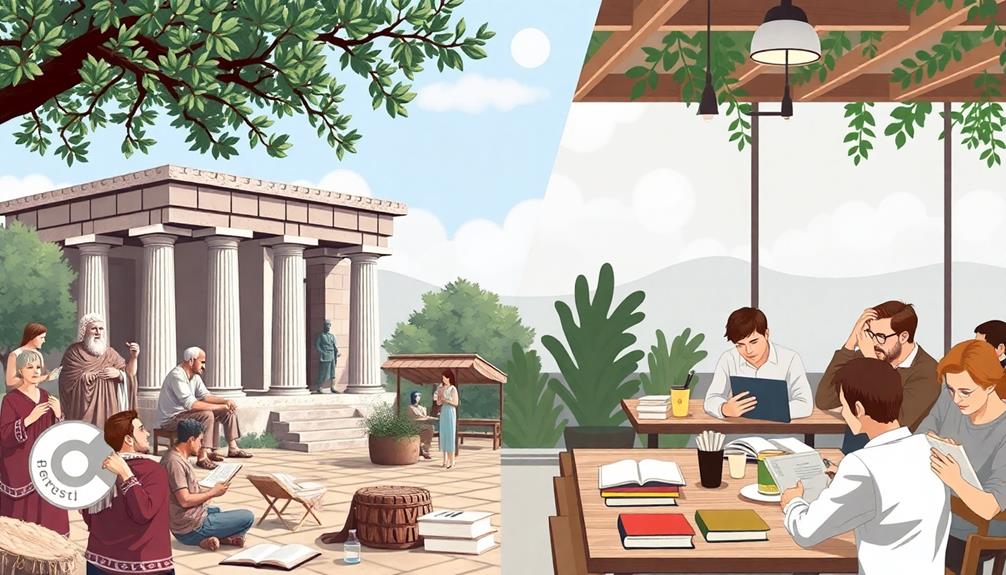
Skepticism serves as a powerful tool in traversing the complexities of modern life, especially in an era rife with misinformation and polarized opinions. By applying lessons from ancient Greece, you can enhance your critical evaluation skills, withholding belief in claims that lack sufficient evidence. This approach helps you build resilience against cognitive biases, making your decision-making processes more robust in both personal and professional contexts.
Engaging in open dialogue and questioning assumptions, much like Sextus Empiricus advocated, fosters a culture of tolerance and understanding among diverse perspectives. In today's society, modern skepticism emphasizes the importance of considering multiple viewpoints, leading to more informed and balanced conclusions in discussions and debates.
Ultimately, practicing skepticism can greatly contribute to your personal growth. It encourages continuous inquiry and adaptability, essential traits in an ever-changing environment.
Influence of Sextus Empiricus

The teachings of Sextus Empiricus provide a foundation for modern skepticism, influencing how you approach knowledge and truth. Active in the 2nd century CE, his writings on ancient skepticism emphasize the radical suspension of judgment on non-evident matters. This practice encourages open-mindedness, allowing you to explore multiple perspectives and challenge dogmatism.
Sextus's influence extends to later philosophers, such as Montaigne, who adopted his ideas to shape modern philosophy. By advocating for the withholding of belief in the absence of evidence, Sextus's principles remain relevant today, especially in discussions about truth and knowledge.
Moreover, his focus on achieving ataraxia, or tranquility, through skepticism helps you stay adaptable against cognitive biases and assumptions. Understanding Sextus can enhance your critical thinking skills and encourage a more nuanced approach to information.
| Principle | Description |
|---|---|
| Suspension of Judgment | Withhold beliefs on non-evident matters |
| Open-mindedness | Explore various perspectives to challenge dogmatism |
| Ataraxia | Seek tranquility through critical examination |
Embracing Uncertainty in Life

Uncertainty is a natural part of life that can lead to personal growth and deeper understanding. By embracing uncertainty, you allow yourself the space for open-mindedness, a critical principle advocated by Sextus Empiricus. He emphasized the importance of the suspension of judgment on non-evident matters, which can help you achieve tranquility amidst life's chaos.
When you accept that not all knowledge is definitive, you foster intellectual growth. This mindset encourages continuous inquiry into your beliefs and assumptions, steering you away from the pitfalls of dogmatism. Engaging with uncertainty sharpens your critical thinking skills, compelling you to assess the validity of evidence and question the foundations of your convictions.
In today's complex world, where misinformation and polarized views abound, embracing uncertainty becomes essential. It equips you to navigate challenges and pursue a more objective truth. By practicing ancient skepticism, you cultivate resilience and adaptability, essential traits for personal development.
Ultimately, embracing uncertainty not only enriches your understanding but also empowers you to explore diverse perspectives, enhancing your journey toward wisdom and clarity.
Frequently Asked Questions
What Is Skepticism in Ancient Greece?
Skepticism in Ancient Greece emphasizes questioning beliefs and suspending judgment. You'll find that it encourages open-mindedness, suggesting that for every belief, there's a plausible alternative, promoting tranquility by avoiding dogmatic certainty and emotional distress.
Which Philosopher Is an Ancient Skeptic?
If you're curious about ancient skepticism, look to Sextus Empiricus. He challenged dogma, emphasized doubt, and urged you to suspend judgment. His insights on questioning beliefs can reshape your understanding of knowledge and certainty.
What Were the Two Schools of Skepticism in Ancient Greece Pyrrhonism and Academic?
There were two main schools of skepticism in ancient Greece: Pyrrhonism, which promotes radical doubt and suspension of judgment, and Academic skepticism, which accepts provisional beliefs while questioning the certainty of knowledge.
Conclusion
Incorporating the wisdom of ancient skepticism into your life can transform how you perceive the world. By embracing uncertainty and questioning assumptions, you empower yourself to navigate challenges with clarity. Remember, even Socrates might've Googled the answers to his inquiries if he'd had the chance! So, keep an open mind, practice critical thinking, and don't shy away from doubt. Ultimately, it's this journey of exploration that leads to deeper understanding and personal growth.
